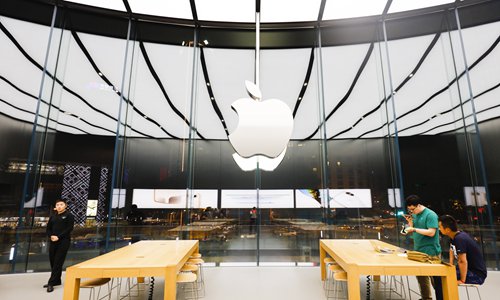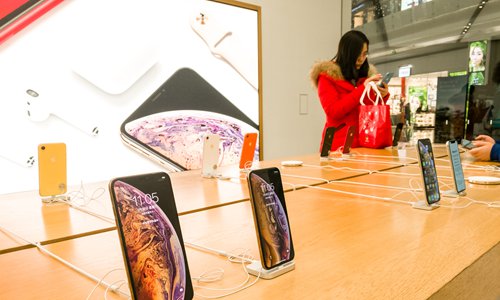HOME >> BUSINESS
American firms challenge govt agencies at hearings
By Chen Qingqing Source:Global Times Published: 2019/6/21 21:58:40

Customers try out iPhones at an Apple store in Nanjing, East China's Jiangsu Province. File photo: VCG
Acting against the people's will by considering more tariffs in the escalating trade war will eventually make the US' own economy miserable.
In the long run, throwing the global supply chain into disarray will make the US suffer more as multinational companies cannot leave China because of its predominant position in the global value chain, business representatives at the public hearings held by US Trade Representative said.
The global supply chain is highly integrated, and a broader opposition against the US plan for tariff hikes on Chinese goods will prove how deeply industries coexist and interact, according to analysts.
At the public hearings, US tech giant Apple urged US authorities not to pursue more tariffs on Chinese products, which will hurt the supply chain and reduce Apple's contribution to the US economy.
"The proposed tariff list covers all of Apple's major products, including the iPhone, iPad, Mac, AirPods, and AppleTV, as well as parts and batteries used to repair products in the US," the company said, urging the US government not to impose tariffs on these products.
The tariffs will not only jeopardize the company's contributions to the US economy but will affect its global competitiveness.
Apple's appeal to the US Trade Representative shows that US authorities have been acting against the will of industry and business representatives by hiking tariffs on China, analysts said. And by forcing more companies to move out of China - a manufacturing hub and the heart of the global supply chain - Washington's trade policies are leading its companies to nowhere, dimming the prospects of US economic growth.
"Apple is a very typical example of globalization, as hundreds of thousands of its products' components are made outside of the US. This broad opposition further shows that the trade policies of the Trump administration are unpopular," said Yang Changyong, a senior research fellow at the Chinese Academy of Macroeconomic Research.
"It also proves that China's defense of free trade is on the right track," he said.
Harley-Davidson, once praised by US President Donald Trump as an icon of his America First strategy, recently decided to make motorcycles in China for the country's potential.
"Companies will have the final say on its investments based on their interests and market rules," Lu Kang, spokesperson of the Chinese Foreign Ministry, told a press briefing on Friday. He noted facts show that foreign companies are bullish about China's market potential and improving business environment.

Consumers at an Apple store in Fuzhou, capital of East China's Fujian Province in January. Photo: VCG
Broad opposition
US companies voiced their concerns over the latest round of tariff hearings and repeatedly claimed they could not remove production lines from China.
The hearings are more like a lesson in economic and globalization common sense, where business representatives from a wide range of industries are pleading for a halt to more tariffs on Chinese goods, by saying, "don't hurt us, don't hurt the US economy," business representatives said.
Another 25 percent increase in tariffs will be catastrophic, and will create new risks to the safety and quality control process, a representative from a California-based child seat manufacturer said, noting that tariff hikes will be transferred to consumers, with retail prices rising by at least 20 percent.
After a five-minute testimony for each representative, officials from different US agencies, including the Treasury Department, Department of Agriculture and Department of Commerce, all asked the same questions, for example, Could you shift production lines to other countries? Almost every company gave the same answer by saying No, drawing the same conclusion that they are incapable of moving out of China.
New York-based Workman Publishing representative Daniel Reynolds brought books to the session on Tuesday and presented them to officials and told them that there is no alternative to China because China is the most efficient provider of specific printing techniques and materials. Two Bible publishers also said increasing tariffs will make bibles more expensive.
Still, growing opposition may not sway American officials in piling tariffs on Chinese goods in the coming days, especially if trade delegations from both sides fail to reach a consensus to end the trade war. But the US economy will pay the price for a disruption in the global supply chain, and will even become miserable, analysts said.
"If the US government goes with more tariffs on $300 billion in Chinese goods, it will significantly weigh on the US economic outlook. But pressuring it more may also help bring it back to the negotiating table," said Ni Yueju, a research fellow at the Chinese Academy of Social Sciences.
The trade war has already caused pain among US consumers. A study published by the US National Bureau of Economic Research in March showed that consumers and producers lost up to $68.8 billion due to the higher cost of imports from tariff hikes in 2018.
"The American people may face higher prices if tariffs continue going up, which will also hurt consumption," Yang said.
Newspaper headline: Trade war ‘against people’s will,’ US economy to suffer